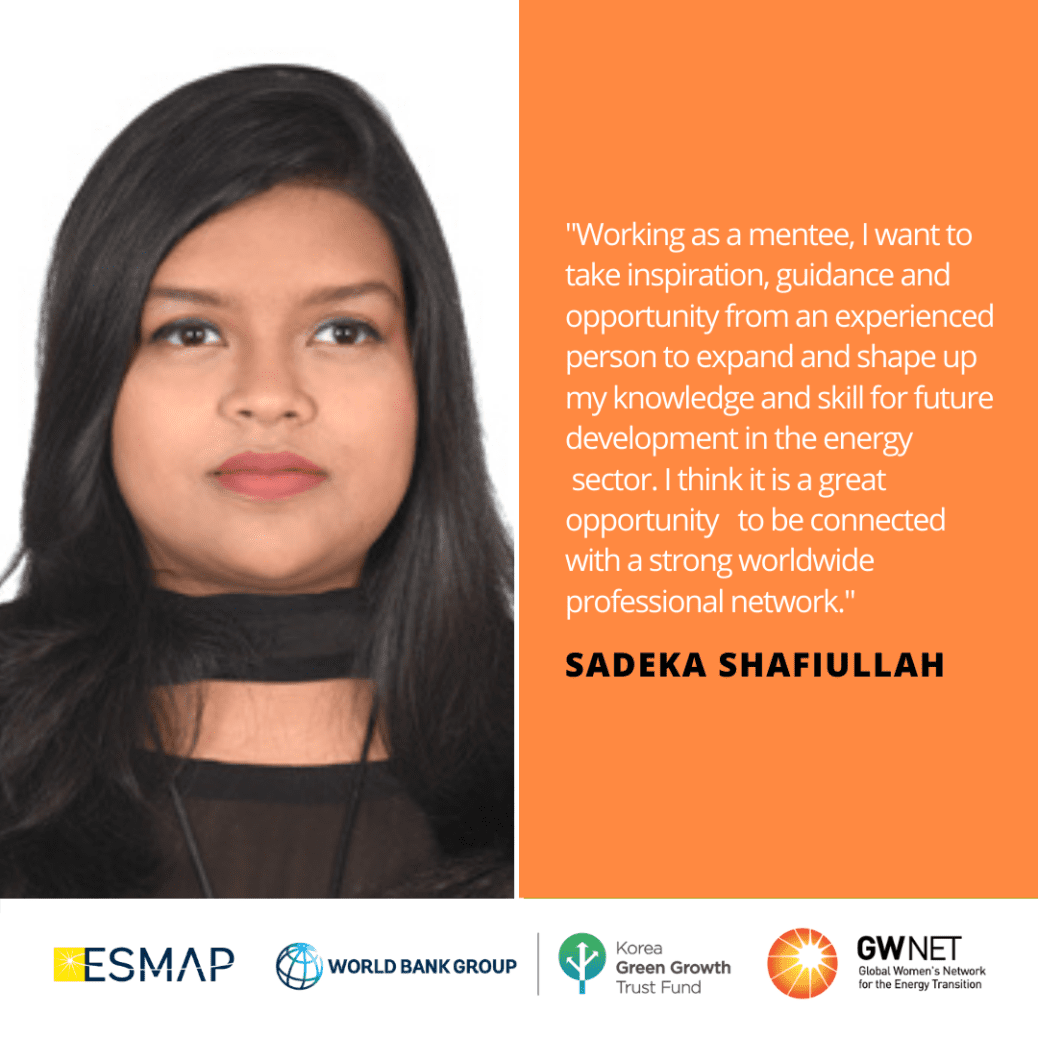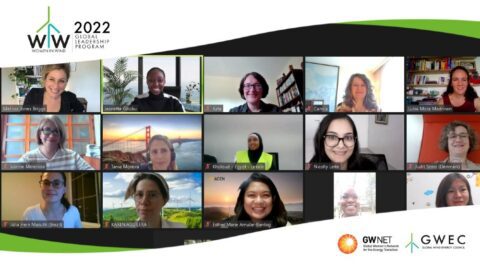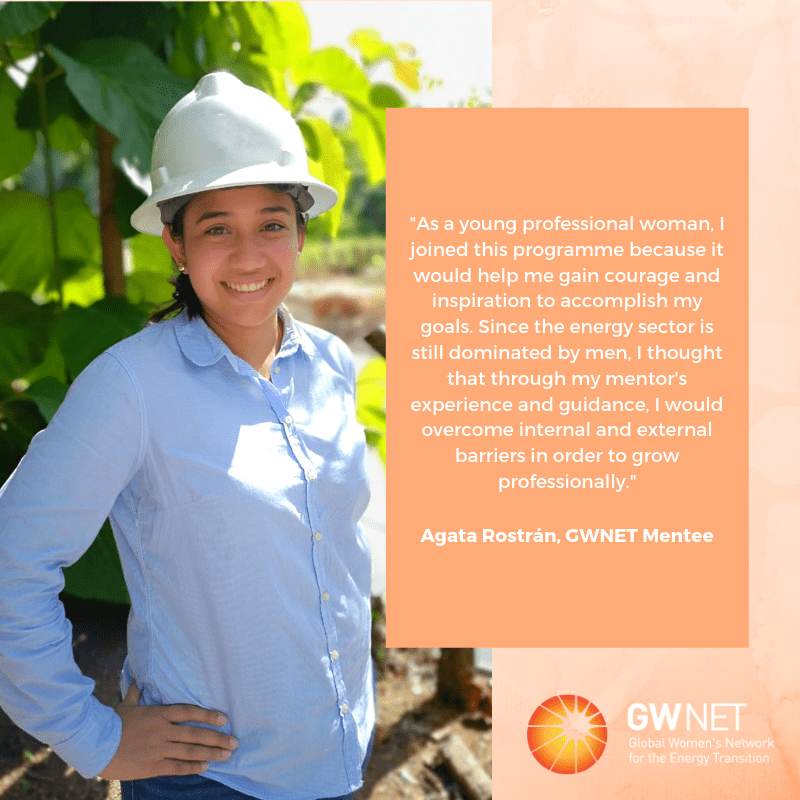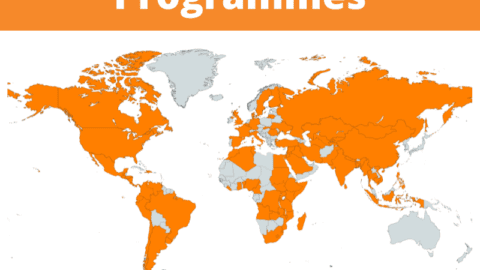The Women in Energy Storage Mentoring Programme sat down with Sadeka Shafiullah, one of this year’s participants, to chat about her journey in renewable energy and the challenges and opportunities for women in the energy storage sector.
1) Tell us a little about yourself. What do you love most about what you do?
I am a graduate Electrical Engineer who completed a Bachelor of Electrical and Electronic Engineering from Ahsanullah University of Science and Technology (AUST) in 2017. I reside in Dhaka, the capital city of Bangladesh.
After my graduation, I have worked for the last 3 years in an engineering consulting company, Prokaushali Sangsad Ltd (PSL), as an Electrical Engineer. My professional competency is in the field of renewable energy, particularly solar power systems.
In addition, I have also worked and participated in several workshops related to gender/women empowerment in the energy sector, which is one of the areas that I love and am keen to learn more. Besides, I love the hands-on experience I get through my job, which allows me to see theory being applied in practice. Another enjoyable aspect of my job is to attend different seminars, workshops, and training programs that help me learn new things, and also enable me to develop a professional network with a diverse range of experts and specialists.
2) What were your goals when you started working in energy storage? Have these evolved?
I became involved with the energy storage sector immediately after graduation. At that time, my priority was to equip myself with the appropriate knowledge and my goal was to advance my career in this sector.
To achieve this, I made an active effort to work on several solar power projects which focus on energy storage. Besides this, my knowledge has further strengthened after attending different workshops and seminars, which helped me learn more about the application of energy storage My goals have not changed much since I have started working in the energy storage sector, and I am always eager to learn more. I believe this mentorship programme shall further evolve my technical excellence in the energy storage arena.

3) How have you adapted to the challenges caused by the COVID-19 pandemic and what advice would you give someone going through similar challenges?
The COVID-19 pandemic has adversely impacted countries around the world since early 2020, including Bangladesh. All the development projects and office works were almost stopped for over 6 months. It is indeed a great challenge for my professional as well as personal life to adapt against this global pandemic. Yet, I manage to overcome the challenges.
While a difficult situation, this pandemic has opened a new avenue for me, such as this mentorship programme. I have been actively seeking opportunities online in order to keep myself engaged with some professional activities.
In my opinion, to adapt to the challenges caused by this unprecedented pandemic, we need to take preventive measures as much as possible. Some of the measures that I have personally adopted include:
- Maintained social distancing and proper sanitization measures.
- Rescheduled office hours among colleagues to avoid mass gathering in the office.
- Became more active, connected, and responsive with coworkers via the internet and online meetings.
- Avoided all movement from one city to another, even on public holidays, to stop exposures.
- Raised self-awareness and maintained proper health care regularly to boost up my immune system, and also encouraged others to do the same.
4) What are the opportunities for energy storage growth in your country?
Bangladesh, being a developing country with a growing economy, offers many opportunities for energy storage systems, which can be explored in different sectors, such as the following:
- Industrial Sector: Garments factory, workshops, or heavy industries might be a great source for energy storage in order to increase efficiency in production, cost optimization, and ensure energy security.
- Commercial Sector: Multi-storied commercial buildings, complexes, NGO’s are increasingly adopting renewable energy sources (mostly PV power) where introducing energy storage might be great value addition.
- Residential Sector: There are many high rise residential buildings, apartments, and private houses, where people are using solar power and it might be a good opportunity for practising energy storage. Besides, in remote areas, introducing Solar Home Systems (SHS), or biogas might be an excellent source of energy storage for practising remote power storage system as a part of the isolated electricity network in those areas.
- Government Sector: There are many ongoing and upcoming power plants planned, where the opportunity for energy storage might be introduced. Remote islands which are under development by the government might also be an opportunity for energy storage.
5) What challenges have you faced in the sector? Can you tell us how you overcame (or are overcoming) this challenge(s)?
I have not personally faced any major challenges, neither in my professional life (as men and woman are equally treated at my workplace), nor at my personal life. More importantly, most of the top management in my company are female.
However, in our country, there are some limitations in case of engaging in field-level work or site-based work, such as power plant operation and maintenance. Usually, night shift work is expected where lack of proper accommodation, safety, social security, and sometimes family consideration exists.
Besides, we don’t have a strong professional network, such that women can access information about the latest technologies, activities, benefits given in other organizations, job opportunities, etc. Building such a network from the university level and some initiatives by universities and the private sector may overcome this challenge to some extent.
6) Why did you join the Women in Energy Storage Mentorship Programme? What do you hope to achieve?
I have joined the Women in Energy Storage Mentorship Programme with a hope to achieve all my goals (as listed below) and be an active member of GWNET after successful completion of this programme.
- To develop my technical skills by learning about newer technologies in the solar energy storage field.
- To improve my managerial and leadership skills by being a part of this mentorship program.
- As my professional competency matches with the overall objective of this mentorship programme, therefore transition will be smooth. Utilizing my previous work experience and the skillset achieved from this mentorship programme, I shall further grow my professional career, as well as, enrich my technical excellence.
- To reach out to the people working globally in the energy storage sector and thereby build my professional network internationally.
- To learn about this growing sector and contribute to a green environment.
- To picture the problems and the scenario of my society globally and assess the options to overcome, considering the local culture.
- To take advantage of this forum to understand various lessons learned in different countries and cultures, and participate in joint problem-solving.
- To gather knowledge on taking up a leadership role and acting as a mentor, speaker, or campaigner.
7) What advice would you give to women hoping to join the energy storage sector?
If women are passionate to build a professional career, energy storage is an excellent sector to work in. When more women start to work in this sector, more women can then lead a resilient and diverse energy industry. Besides, women shall be able to build up a strong professional global network. Women should be positive towards life and one must not give up.
Read more about GWNET’s mentoring programmes here.











